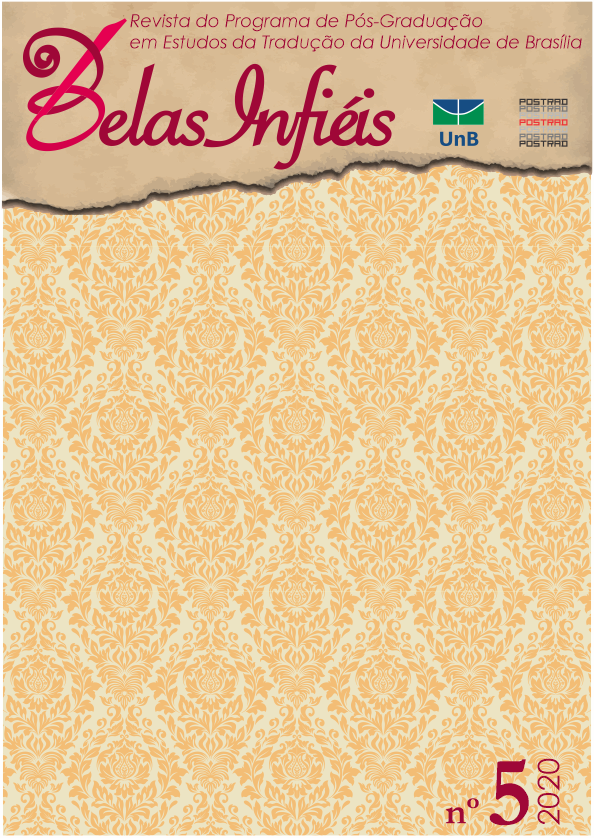“Hymn to the Muses” in Hesiod’s Theogony (vv. 1-115)
DOI:
https://doi.org/10.26512/belasinfieis.v9.n5.2020.29613Keywords:
Hymn to the Muses. Theogony. Hesiod. Poetic translation. Transcreation.Abstract
Most of the existing Portuguese translations of Hesiod’s Theogony have a philological approach, considering mainly the meaning of the Greek text instead of the materiality of the signifiers that compose it. In Poundian terms, logopoeia and phanopoeia generally prevail, without an appreciation of the melopoeia that is so characteristic of ancient Greek poetic production. Based on these brief reflections regarding the possibility of a new “transcreation” of the Theogony (“transcreation” in the sense given by Haroldo de Campos to that word), I present a new translation into Portuguese of the first 115 verses of Hesiod’s Theogony, that is, of the passage known among Hellenists as “Hymn of the Muses”: in my translation, I will seek solutions that take into account the totality of the linguistic sign in order to provide a poetic experience of these verses also in Portuguese.
Downloads
References
CAMPOS, André Malta. Resenha de CAMPOS, Haroldo de; VIEIRA, Trajano. Mênis ”“ A Ira de Aquiles: Canto I da Ilíada de Homero. Edição bilíngue. São Paulo: Nova Alexandria, 1994. Letras Clássicas, São Paulo, n.2, p. 387-401, 1998. Disponível em: http://www.revistas.usp.br/letrasclassicas/article/view/73747. Acesso em: 3 fev. 2020.
CAMPOS, Haroldo de. Tradução e reconfiguração: O tradutor como transfingidor. In: TÁPIA, Marcelo; NÓBREGA, Thelma Médici (org.). Transcriação. São Paulo: Perspectiva, 2013. p. 109-130.
HÉSIODE. Théogonie: La naissance des dieux. Trad., prés. et notes de Annie Bonnafé. Précédé d'un essai de Jean-Pierre Vernant. Paris: Éditions Rivages, 1993. Tradução de: Θεογονία.
HESIODI. Theogonia. Opera et dies. Scutum. Edidit Friedrich Solmsen. Oxford: Oxford University Press, 1970. Tradução de: Θεογονία.
HESÃODO. Teogonia ”“ Trabalhos e Dias. Prefácio de Maria Helena da Rocha Pereira. Introdução, tradução e notas de Ana Elias Pinheiro e José Ribeiro Ferreira. Lisboa: Imprensa Nacional-Casa da Moeda, 2005. Tradução de: Θεογονία.
HESÃODO. Teogonia. Tradução e introdução de Christian Werner. São Paulo: Hedra, 2013. Tradução de: Θεογονία.
HESÃODO. Teogonia: a origem dos deuses. Estudo e tradução de Jaa Torrano. São Paulo: Iluminuras, 2. ed., 2012. Tradução de: Θεογονία.
JAKOBSON, Roman. Lingüística e poética. In: Lingüística e comunicação. Prefácio de Izidoro Blitzkein. Traduzido por: Izidoro Blitzkein e José Paulo Paes. São Paulo: Editora Cultrix, 1968. p. 118-162. Tradução de: Linguistics and Poetics (1960).
LORD, Albert. The Singer of Tales. New York: Atheneum, 1971.
OLIVA NETO, João Angelo. “Tradução Literária e Estudos Clássicos Brasileiros.” In: Ritmo e Sonoridade na Poesia Grega Antiga: Uma tradução comentada de 23 poemas, de Leonardo Antunes. São Paulo: Humanitas / FAPESP, 2011. p. 9-24.
PARRY, Milman. The making of homeric verse: The collected papers of Milman Parry. Adam Parry (ed.). Oxford: Clarendon Press, 1971.
PAZ, Octavio. Verso e prosa. In: Signos em rotação. Traduzido por: Sebastião Uchoa Leite. São Paulo: Editora Perspectiva, 1976. p. 11-36. Tradução de: Verso y prosa (1956).
POUND, Ezra. ABC of Reading. London; Boston: Faber and Faber, 1951.
SILVA, Rafael. Teogonia: a gênese de uma nova tradução. Revista Versalete, Curitiba, v. 2, n. 2, p. 133-144, 2014. Disponível em: http://www.revistaversalete.ufpr.br/edicoes/vol2-02/RafaelDaSilva.pdf. Acesso em: 7 set. 2020.
Downloads
Published
How to Cite
Issue
Section
License
Copyright (c) 2020 CC BY

This work is licensed under a Creative Commons Attribution 4.0 International License.
Given the public access to this journal, the texts are free to use but requires the recognition of the original authorship and initial publication in this journal to be properly stated.
 The journal allows the use of works published for non-commercial purposes, including the right to submit the work to publicly accessible databases. Published contributions are the sole and exclusive responsibility of the author(s).Â



















